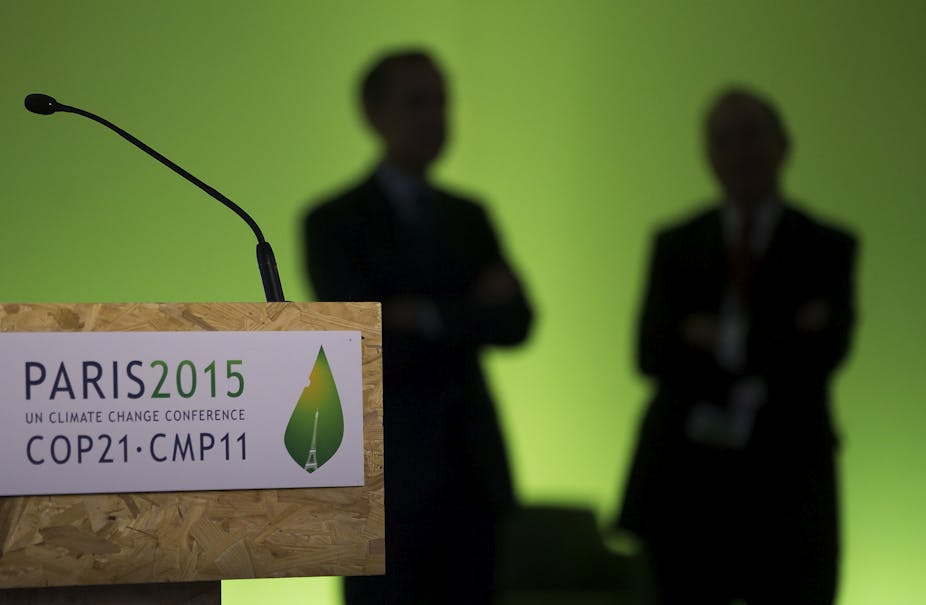The top story at COP21 is understandably the race to agree on a climate deal to limit levels of global warming. The key stumbling block remains the thorny issue of differentiation – the level of responsibility that developed and developing countries bear for reducing emissions.
Yet an equally important set of parallel discussions is going on outside of the negotiation rooms among those in the business community. Backstage at the conference, big shifts in business outlook on climate change have been obvious and evident at sideline events like those hosted by the World Business Council for Sustainable Development (WBCSD).
CEOs like Paul Polman of Unilever and many others have expressed firm commitments to concrete action against climate change. He announced that Unilever will be “carbon positive” by 2030, committing to eliminate fossil fuels from its operations and produce more renewable energy than it consumes. Monsanto announced that they will be carbon neutral by 2021 in an effort to reduce the carbon footprint of its crop production. This is a markedly different position than in Copenhagen at COP15.
Only human
During Al Gore’s speech at the WBCSD meeting, many in the room became emotional when he asked us to consider why we were there, and to connect with our personal motivations for change. Business is made up of human beings, not spreadsheets. And people increasingly understand that climate change is real, happening now, and requires radical reductions in greenhouse gas emissions.
The UK floods are a case in point. The day after I arrived in Paris, I found out that my husband and children in Lancaster, like many others, were dealing with the fall-out of extreme weather, the type of pattern that is consistent with what we know about the feedback effects of global warming.
There is some obvious poignant irony to be at COP21 while my family and colleagues back home are dealing with the deluge of Storm Desmond. I posted photos on Twitter and shared them on the conference business app. When I bumped into the president of an oil company and commented that it was “weird to be here while my family are becoming climate refugees”, he agreed and shared his heartfelt concern. While we disagree on the solutions needed to move forward, we are united in our concern for people.
Another business director summed it up by saying: “It’s just getting silly, isn’t it? Let’s just fix it.” And he’s not alone. UN secretary-general Ban Ki-moon also came down from Le Bourget, where the negotiators are meeting, to encourage these business leaders to take action now. He said that business had to be an integral part of the solution, and again the business audience responded with a sense of urgency.

Later in the week, sitting beside Maros Sefcovic, vice president of the European Commission, Peter Bakker, CEO of WBCSD, put it simply: “Business wants three things – give us a long-term, clear goal. Give us a five-year review period to ratchet up ambition. And, even though we know this has not made it into the agreement, we need a price on carbon to go fast.”
Business backing
While the final agreement is still being negotiated, we do know that carbon pricing has not made the cut. And that’s a shame. But business will move ahead anyway.
At the COP, I asked Bakker how he was feeling. He said: “I am more optimistic about our ability to fix the planet now than before I came. Mostly because of the mass mobilisation of business, cities, sub-nationals. And the strong belief in the science.”
Another top executive from a global transportation company said that the collective efforts being made in Paris gave him hope. “World leadership; government, business, academics etc have more clearly moved from debating we have a climate change problem to how we address the problem.” That’s a good thing.
When business gets behind a cause, tremendous action can happen. Agriculture, for example, accounts for about 13% of global emissions so to have a company like Monsanto commit to carbon neutral crop production is a big deal. While business may be in force at Le Bourget, however, it is still on the sidelines and not in the negotiations. But the business push for real action on climate change is pervasive, and action doesn’t have to solely come from the negotiation rooms.
Business culture is changing, with investors and executives increasingly accepting that climate change is happening and affecting their bottom lines. Imran Rasul, vice president of procurement at BT Group, expressed how much he learned from his time in Paris: “The best bit for us was the Paul Polman bit. We are naturally sceptical business people, and we got no bullshit but honest conversations. This is important because it gets to the truth of what the real issue and challenges are … We’re all in leadership positions in organisations, not just in sustainability. And we take these ideas back to our roles and that can make a functional difference to everyday decision making. I’ve become a convert.”
And perhaps that is more important than whatever comes out of the Paris summit. While business leaders still represent the world elite, if climate action becomes embedded in business-as-usual, the more likely we are to effectively decarbonise the economy.

